Episcopal, Cuban churches celebrate reunion after more than half-century apartPosted Mar 9, 2020 |
|
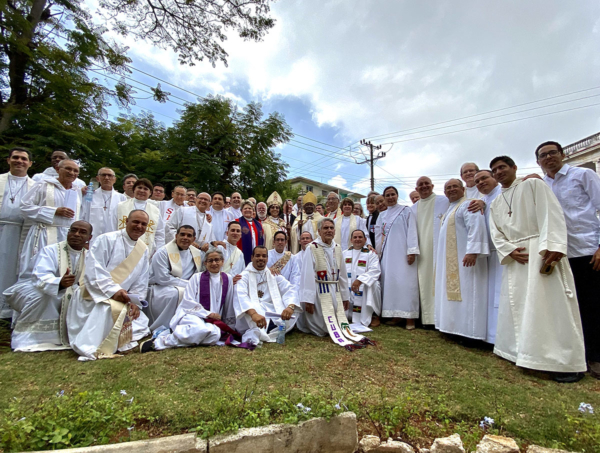
The Episcopal Church and Episcopalians in Cuba celebrate the Diocese of Cuba’s readmission into The Episcopal Church during a March 6 Eucharist at Holy Trinity Cathedral in Havana. Photo: Lynette Wilson/Episcopal News Service
Editor’s note: Leer el artículo en español aquí.
[Episcopal News Service – Havana, Cuba] It’s official. The Episcopal Church in Cuba has returned to The Episcopal Church as the Diocese of Cuba.
“Today really was finally the outward and visible sign of the inward and spiritual grace of our hearts and our lives coming together as one church,” said Presiding Bishop Michael Curry in a March 6 interview with Episcopal News Service following a Eucharist at Havana’s Holy Trinity Cathedral recognizing the readmission of the Episcopal Church in Cuba as a diocese.
“This was a reunion, a reconciliation, a re-communion with one another in Jesus Christ,” Curry said. “This was a celebration of what God does. As St. Paul said, ‘If anyone is in Christ, there is a new creation; the old is passed away. Behold the new has come!’ And we saw, for one brief shining moment, something of that new that is coming.”
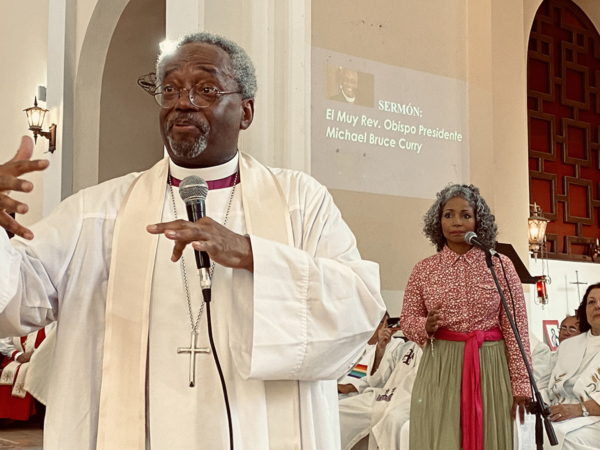
Presiding Bishop Michael Curry preaches and Luz Dinorah Padro, the church’s manager for language services, interprets during a Eucharist March 6 celebrating the Diocese of Cuba’s readmission into The Episcopal Church at Holy Trinity Cathedral in Havana. Photo: Lynette Wilson/Episcopal News Service
Along with Curry, the Rev. Gay Clark Jennings, House of Deputies president; Episcopal bishops representing dioceses in partnerships with the Diocese of Cuba; members of Cuba Bishop Griselda Delgado del Carpio’s 2011 College for Bishops’ class; and other supporters from the United States and Canada celebrated Cuba’s readmission during the Eucharist that preceded the official start of Cuba’s Diocesan Convention.
“We love Cuba,” Curry said to applause as he took the microphone at the beginning of his sermon. “It’s so good to be here. … On behalf of the entire Episcopal Church, we love Cuba.”
In his sermon, Curry referenced John 15, the Last Supper, when Jesus knew he was going to die.
“He was willing to give his life, not for himself, but for others,” Curry said. “That’s what love looks like. … And Jesus said, ‘Abide in me as I abide in you. I am the vine, you are the branches. As the father has loved me, so have I loved you. Now abide in my love.’”
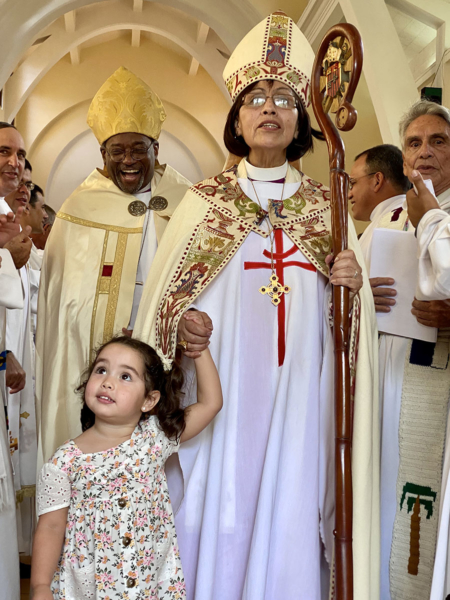
Cuba Bishop Griselda Delgado del Carpio holds her granddaughter’s hand as she and Presiding Bishop Michael Curry process out of Holy Trinity Cathedral in Havana. Photo: Lynette Wilson/Episcopal News Service
Curry also recognized Delgado’s long-held desire for the Cuban church to rejoin The Episcopal Church and become part of a larger family.
“Not only Cuba must become part of a big family, but The Episcopal Church must be part of a big family … not only part of the Christian family, but the human family,” Curry said. “And Jesus has called us to be family so that we followers of Jesus can be a witness to the rest of the world of what God’s dream is for the whole human family. God made this world so that we would learn to be family.
“God is the vine and we human beings are the branches, and we will make a better world when we live in God and with each other,” Curry said.
Turning to face Delgado, who was seated in a chair behind him, and addressing her directly, Curry said, “When you said we must be part of a big family, the Holy Spirit was speaking through you, my sister. We must be part of a big family.”
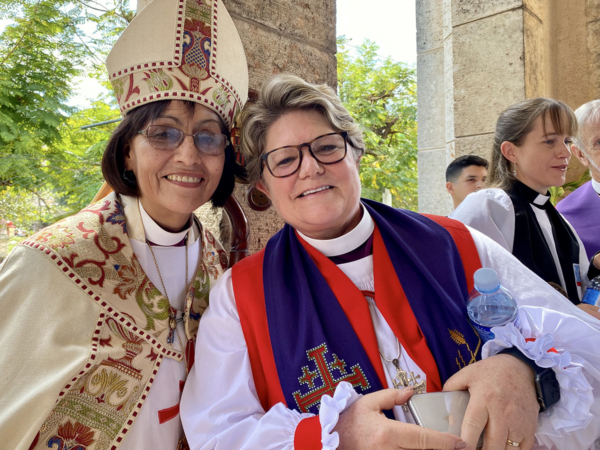
Cuba Bishop Griselda Delgado del Carpio and Central New York Bishop DeDe Duncan-Probe pose for a photo outside Holy Trinity Cathedral in Havana, March 6. Photo: Lynette Wilson/Episcopal News Service
For more than half of its 110-year history, the Cuban church has been separated from The Episcopal Church. The readmission, or reunification, is something Delgado has worked toward since she became bishop coadjutor in 2010.
“I’m feeling that the Holy Spirit has held my hand all the time,” Delgado said in an interview with ENS. “As a human being, I wouldn’t have had the capacity without the strength of the Holy Spirit. I believe this moment was chosen by God that we return to The Episcopal Church. Years ago, we made a petition (for readmission), but at the time, we couldn’t reach the goal.”
This time, readmission was something accomplished “detail by detail,” along with the support of The Episcopal Church, she told ENS, adding that there are still details to be worked out and that becoming a full diocese will require a different way of relating to one another.
“It will be quite a new experience for the two churches walking along together, but the experience itself will teach us how to keep going,” she said.
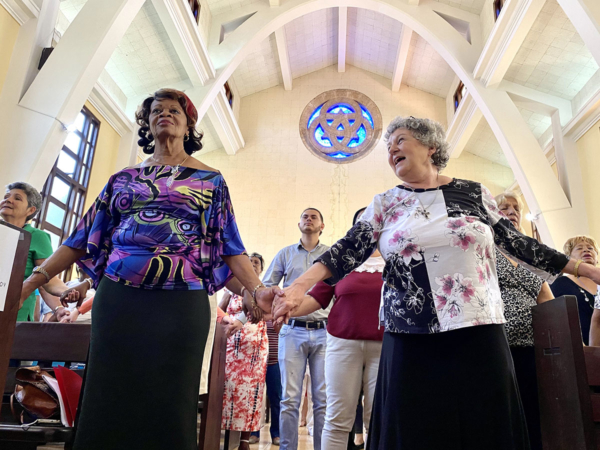
Congregants hold hands while singing during the Eucharist celebrating the Diocese of Cuba’s readmission into The Episcopal Church. Photo: Lynette Wilson/Episcopal News Service
Executive Council formally approved the Cuban church’s readmission at its February 2020 meeting in Salt Lake City, Utah. The Diocese of Cuba joined Province II, which includes dioceses from New York and New Jersey in the United States, the Convocation of Episcopal Churches in Europe, Haiti and the Virgin Islands.
During the 79th General Convention held in Austin, Texas, in 2018, the House of Bishops voted unanimously to readmit the Cuban church as a diocese, with the House Deputies concurring.
Though the readmission process accelerated after the 79th General Convention, it first was set in motion five years ago. In March 2015, two months after the United States and Cuba agreed to re-establish diplomatic relations following a 54-year breach, the Episcopal Church of Cuba’s synod voted 39 to 33 in favor of returning to the church’s former affiliation with The Episcopal Church. That summer, the 78th General Convention called for closer relations with the Cuban church and a lifting of the decades-long U.S. economic embargo against Cuba. (The Episcopal Church, through General Convention resolutions, has long supported ending the embargo.)
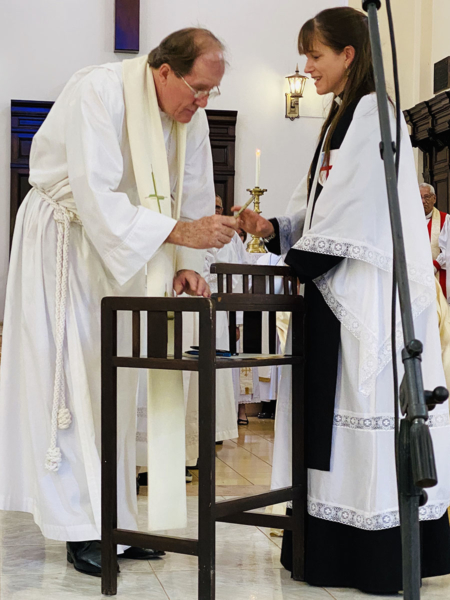
At right, the Rev. Molly James, deputy executive officer of General Convention, witnesses as the Very Rev. Jose Angel Gutierrez, dean of Holy Trinity Cathedral in Havana, signs the Oath of Conformity as part of the Eucharist celebrating the Diocese of Cuba’s readmission into The Episcopal Church. Photo: Lynette Wilson/Episcopal News Service
During the Eucharist on March 6, 2020, Delgado, Bishop Suffragan Ulises Mario Aguero Prendes, priests and deacons signed the oath of conformity, according to Article VIII of church’s Constitution and Canons.
Following the 79th General Convention’s action to readmit the Cuban church, The Episcopal Church in February 2019 launched a campaign to raise $800,000 to provide retirement benefits for active and retired Cuban clergy.
Donations have exceeded that goal, according to T.J. Houlihan, associate director and senior development officer for The Episcopal Church’s episcopalchurch.org/development, which led the campaign.
“When The Episcopal Church separated from the Episcopal Church in Cuba in 1966, all of the systems and benefits, including pension contributions, were no longer available to Cuban clergy. Now that the church is reconciled and Cuba has been reunited, this funding will ensure that Cuban clergy are treated comparably to their sister and brother clergy throughout The Episcopal Church,” said Houlihan, who added that the campaign continues.
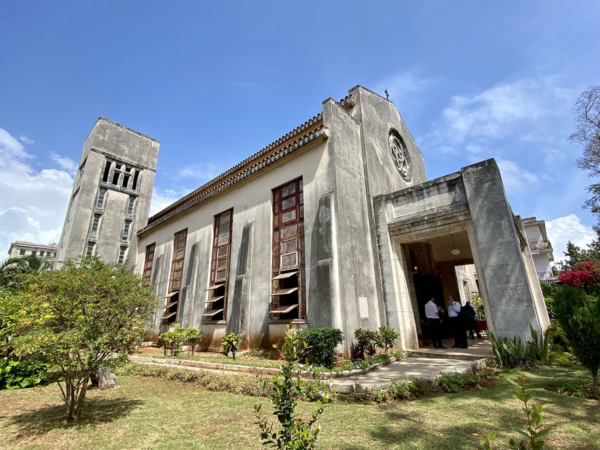
The Diocese of Cuba’s Holy Trinity Cathedral was built in 1946 in Havana. Photo: Lynette Wilson/Episcopal News Service
The Episcopal Church of Cuba traces its origins back to an Anglican presence that began on the island in 1871. In 1901, it became a missionary district of The Episcopal Church. The two churches separated in the 1960s, after Fidel Castro seized power following the 1959 Cuban Revolution and diplomatic relations between the two countries disintegrated. The Episcopal Church of Cuba has functioned as an autonomous diocese of the Anglican Communion under the authority of the Metropolitan Council of Cuba since the separation in the late 1960s. The primates of the Anglican churches of Canada and the West Indies and The Episcopal Church chair the Metropolitan Council.
“Now we go to work. … The church here in Cuba has been doing the work here, but now in a new and different way, we’re doing it together,” Curry said in a conversation with ENS. “And their witness is going to have an impact on the rest of The Episcopal Church because they’ve had to, they’ve learned to be, Christian and to follow Jesus in a very different cultural context, and so they are going to witness to us how to follow Jesus. … In many respects, the whole Anglican Communion is going to be profoundly enriched by the witness of the church in Cuba.”
– Lynette Wilson is managing editor of Episcopal News Service.

Social Menu